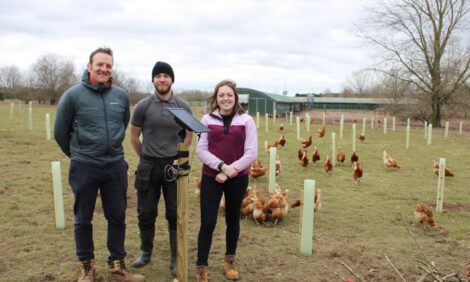



Wild Geese in China 'Prisoners' in Their Own Wetlands
CHINA - In many places in the world, goose populations are booming as the birds have moved out of their wetland habitats to exploit an abundance of food on farmland.But, new evidence reported in Current Biology on 22 May confirms that things aren't working so well for migratory waterbirds that overwinter in China.
The findings help to explain why China's waterbirds are in decline, researchers say.
"We can now show what we suspected all along, namely that geese do not sneak off the wetlands to feed on farmland at night, but rather remain within the wetlands close to where they feed and roost both by day and night," says Lei Cao of the Chinese Academy of Sciences.
"Whilst this saves them energy and the risk of death from the hunters and poachers they encounter on dry land, it does constrain them to the wetlands and the quality of the food that they can find there."
The waterbirds that spend their winters in China's Yangtze River wetlands travel a long way to get there, migrating from Russia, Mongolia, and other parts of China to avoid the icy northern winters.
"These birds have nowhere else to go; farther north everything is frozen, and to the south there are no vast river systems or freshwater wetlands," Dr Cao says.
Dr Cao and her colleagues have been concerned about geese and other waterbirds in China since surveys they conducted in the early 2000s showed that the birds were in decline. In the new study, they wanted to learn more about where the birds spend their time.
The researchers attached GPS tracking devices to 67 wintering wild geese representing five different species at three important wetlands in China's Yangtze River Floodplain and followed the animals throughout the winter.
The tracking data showed that 50 of the birds representing species known to be in decline never left degraded natural wetlands where they've spent their winters for generations. Another 17 individuals from two species that show more stable population trends used wetlands the vast majority of the time. However, they did occasionally venture into neighboring rice paddies.
"This is a vital piece of evidence to support our hypothesis that, because Chinese geese are clearly 'prisoners' of their wetland habitats, their recent declines relate to reductions in the quality and extent of these wintering habitats upon which they rely," Dr Cao says.
The results help to confirm earlier studies linking declines among Chinese wintering geese to habitat loss and a degraded food supply. But what keeps geese in China from taking advantage of neighboring rice paddies and other agricultural lands in the way geese do in other places?
Dr Cao and colleagues speculate that it's because of greater human activity in cereal and rice fields in China. Chinese farmers also raise domestic ducks and geese in the stubble fields, leaving little food behind for their wild counterparts.
Wintering geese are also a popular target of hunters who use shotguns, nets, traps, and poison to kill thousands upon thousands of birds every year. As a result, they conclude, the geese are effectively imprisoned in increasingly degraded wetland habitats.
The researchers say they'll continue to explore the unique threats faced by these birds in China. They're also building international collaborations and partnerships throughout East Asia to study and identify trouble spots for the birds all along their long-distance migratory routes.









